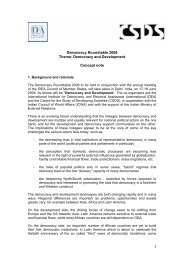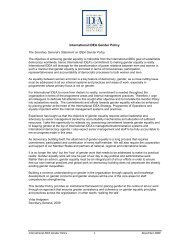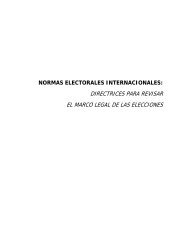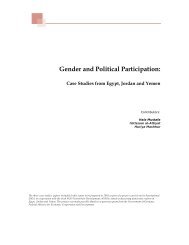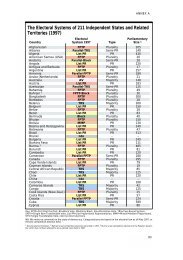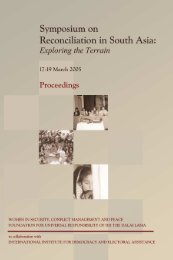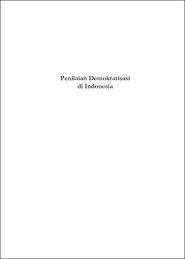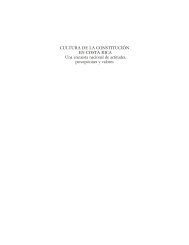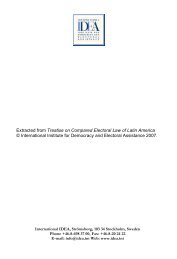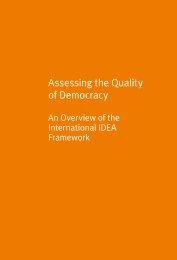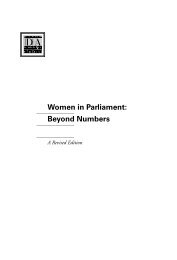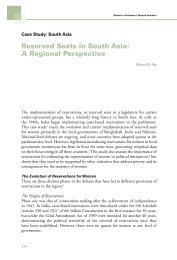The Role of State Constitutions in Protecting ... - International IDEA
The Role of State Constitutions in Protecting ... - International IDEA
The Role of State Constitutions in Protecting ... - International IDEA
You also want an ePaper? Increase the reach of your titles
YUMPU automatically turns print PDFs into web optimized ePapers that Google loves.
throughout the 29 years <strong>of</strong> military rule. On return to civilian rule <strong>in</strong> 1979, there<br />
is only one constitution for the whole country.<br />
We have argued elsewhere that federalism <strong>in</strong> Nigeria particularly as it affects<br />
resource allocation and m<strong>in</strong>ority groups can be divided <strong>in</strong> to two phases:<br />
<strong>The</strong> phase before military rule and the phase after the military take over <strong>in</strong><br />
1966. Dur<strong>in</strong>g the First Republic (1960- 1966), the revenue <strong>of</strong> the country<br />
was distributed based on derivation pr<strong>in</strong>ciple. 50 percent <strong>of</strong> the revenue<br />
from m<strong>in</strong>eral resources was given to the region from where the m<strong>in</strong>erals<br />
were extracted. Another 30 percent was put <strong>in</strong> a distributable pool, which<br />
is divided among all the regions <strong>in</strong>clud<strong>in</strong>g the produc<strong>in</strong>g region. Only 20<br />
percent went to the Federal Government. <strong>The</strong> military took over power <strong>in</strong><br />
1966, which was followed by a 30 month civil war. Most <strong>of</strong> the oil<br />
produc<strong>in</strong>g communities was <strong>in</strong> the Republic <strong>of</strong> Biafra, so declared by Col.<br />
Emeka Odumegwu Ojukwu. In 1969, when the Federal Military<br />
Government had successfully “liberated” the oil produc<strong>in</strong>g communities, it<br />
promulgated the Petroleum Decree (No 51) <strong>of</strong> 1969 that vested all the<br />
lands and the resources <strong>in</strong>, under or upon the Land on the Federal Military<br />
Government. <strong>The</strong>re is no doubt that the Federal Government has<br />
cont<strong>in</strong>ued with this war strategy on the Niger Delta people till date. 28<br />
Challenges <strong>of</strong> ethnic and religious diversity <strong>in</strong> Nigeria<br />
…ethnic and religious<br />
manipulation by the<br />
political elite has posed<br />
challenges to governance<br />
and security <strong>in</strong> Nigeria.<br />
<strong>The</strong> ethnic and religious composition <strong>of</strong> Nigeria and its manipulation by the<br />
political elite has posed many challenges to governance and security <strong>in</strong> Nigeria.<br />
This has been aggravated by the failure <strong>of</strong> the <strong>State</strong> to perform its core duties <strong>of</strong><br />
ma<strong>in</strong>ta<strong>in</strong><strong>in</strong>g law and order, justice and provid<strong>in</strong>g social services to the people. For<br />
<strong>in</strong>stance, the failure <strong>of</strong> the <strong>State</strong> has led to the emergence <strong>of</strong> ethnic militias <strong>in</strong><br />
several parts <strong>of</strong> the country such as the Odua Peoples’ Congress (OPC) and the<br />
Baakasi Boys.<br />
Much has been written on the politicization and manipulation <strong>of</strong> ethnic and<br />
religious identities <strong>in</strong> Nigeria. 29 In the past twenty years, there is a resurgence <strong>of</strong><br />
ethnic and religious violence <strong>in</strong> Nigeria. It is <strong>in</strong>structive to note that this<br />
resurgence co<strong>in</strong>cided with economic crisis experienced <strong>in</strong> Nigeria and the<br />
<strong>in</strong>troduction <strong>of</strong> Structural Adjustment Programme (SAP). 30 <strong>The</strong> sources <strong>of</strong><br />
conflict <strong>in</strong> Nigeria <strong>in</strong>clude militarism, absence and distortions <strong>of</strong> democracy,<br />
economic problem, collapse <strong>of</strong> the educational sector, the grow<strong>in</strong>g army <strong>of</strong><br />
28) Ramphal, (1979)<br />
28) Igbuzor, O. (2002), “Federalism and Resource Control <strong>in</strong> Nigeria,” <strong>in</strong> Igbuzor, O and Bamidele, O (Eds), Contentious<br />
Issues <strong>in</strong> the Review <strong>of</strong> the 1999 Constitution, Lagos, Citizens Forum for Constitutional Reforms (CFCR)<br />
29) Otite, O. (1990), Ethnic Pluralism and Ethnicity <strong>in</strong> Nigeria, Ibadan, Shaneson; Nnoli,, O. (1978), Ethnic Politics <strong>in</strong><br />
Nigeria, Enugu, Fourth Dimension Publishers<br />
30) Ihonvbere, J.O. (1993) “ Economic Crisis, Structural Adjustment and Social Crisis <strong>in</strong> Nigeria” <strong>in</strong> World Development,<br />
No. 1; Osaghae, E. E. (1995), Structural Adjustment and Ethnicity <strong>in</strong> Nigeria, Uppsala, Nordiska Afrika<strong>in</strong>stitutet Research<br />
Report No. 98; Egwu, S. G. (1998), Structural Adjustment, Agrarian Change and rural Ethnicity <strong>in</strong> Nigeria. Uppsala,<br />
Nordiska Afrika<strong>in</strong>stitutet Research Report No. 103<br />
48



